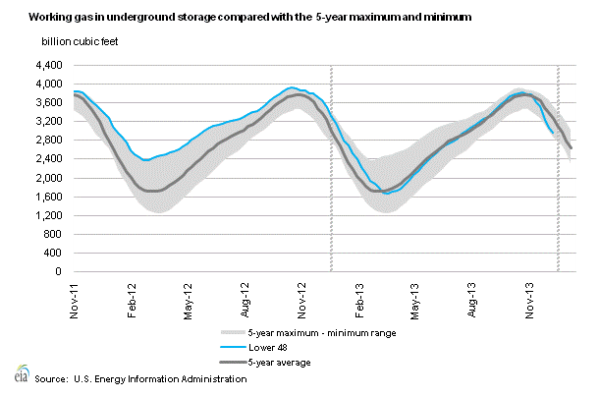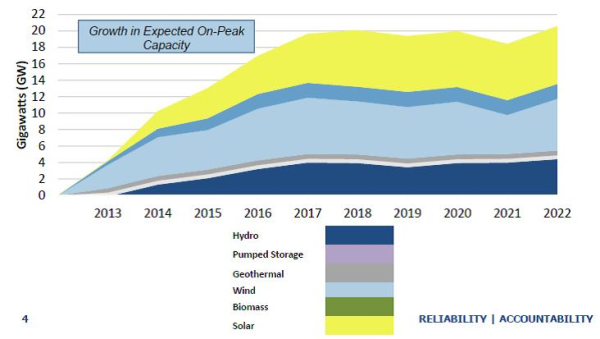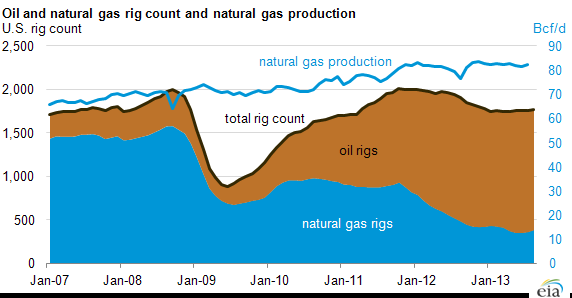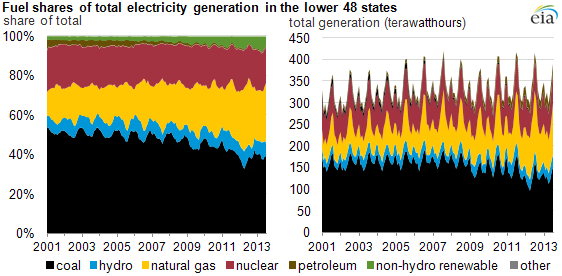Midwest and Northeast residents have not experienced an arctic blast of this magnitude in more than a decade. The system has moved eastward from Illinois through New England. The all-time record low in Chicago of -11˚F was recorded in 1994 and temperatures on January 6 are expected to be -6˚F, very close to such record. Not only is the storm dumping considerable amounts of snow (5” - 12”), but it is also bringing frigid, below normal temperatures with the coldest air so far this season. Temperatures are expected to be between 20˚F - 40˚F below average in large parts of the continental U.S. through next week. Moreover, sustained 15-50MPh winds are expected, so blizzard warnings have been issued in Cape Code and Long Island. An additional storm behind Hercules will keep temperatures well below normal through early next week.
Winter Storm Hercules-Boosts Near-Term Demand for Natural Gas
Posted by Jennifer Chang on Jan 3, 2014 12:59:00 PM
Topics: energy sourcing, Acclaim Energy Advisors, energy management consulting, risk management, energy, Energy Solutions, energy procurement, weather outlook, reliable energy, energy regulations, energy reliability, energy savings, energy costs, power generation, Weekly Energy Insights, energy management consultants, Texas, dynamic load optimization 365, DLO 365, Winter Weather, U.S. energy, exports
A great deal has been made out of the need to shift away from coal fired power plants and toward renewable energy sources, such as wind and solar in the U.S. While this is certainly a laudable goal, the full impact of a move to renewable power generation has consequences beyond simply reducing emissions and finding alternative power sources. Specifically, determining how to effectively integrate these new power sources, particularly wind and solar, which are highly variable and can go from zero to full production almost instantaneously, pose significant challenges for grid operators.
Topics: system operators, coal, energy risk management, energy sourcing, Acclaim Energy Advisors, risk management, energy, energy procurement, demand response, energy regulations, energy reliability, energy savings, energy costs, power generation, Weekly Energy Insights, natural gas, economic demand response, energy management consultants, strategic energy sourcing, energy price spikes, renewable energy, energy supply, U.S. energy, load generators
The Negawatts Evolution: The Maturation of Demand Response
Posted by Jennifer Chang on Dec 9, 2013 12:06:00 PM
Several decades ago the term “negawatt” gained notoriety; however, as deregulated markets have developed and with the rise of Demand Response (DR) programs, the concept of reducing energy spend through the deployment of more energy efficient technologies has evolved into something larger. The negawatt concept has expanded from its foundation with the growth in utility and Independent System Operator (ISO) DR programs. Another important, and more recent, development has been the growth of economic price response, which is the ability to add capacity to the grid or shed load when real-time market conditions create financial incentives. The combination of flexible distributed generation, access to real-time price data, and ”structural incentives” in deregulated markets have enabled end-users to profit from these programs andactivities. In ERCOT for example, these incentives include price scarcity mechanisms (Operating Reserve Demand Curve) and system-wide offer caps that will increase to $9,000/MWh on June 1, 2015. Aside from generating revenues for end-users, these measures will contribute to improve balance between supply and demand, and support overall grid reliability.
Topics: Negawatt, ERCOT, energy risk management, Acclaim Energy Advisors, energy management consulting, energy, Energy Solutions, energy procurement, demand response, energy regulations, energy savings, energy costs, Weekly Energy Insights, energy management, dynamic load optimization 365, DLO 365, curtailment
ERCOT Revamping Power Forecasting Methodologies: Reserve Margin Challenges
Posted by Jennifer Chang on Dec 5, 2013 6:45:00 PM
There has been significant debate, quite heated at times, surrounding the future structure of the Texas electricity market that the Electric Reliability Council of Texas (ERCOT) manages. The discussion has been centered on several topics, including how to ensure that there is sufficient generation capacity in the state to meet future electricity needs. On October 25, 2013, without a final vote, two out of the three Public Utility Commission of Texas (PUCT) commissioners expressed support for a mandatory reserve margin to address resource adequacy concerns. At this time, ERCOT’s board does not plan to take action on proposed changes to the target reserve margin until the PUCT provides further direction. In the meantime, ERCOT has been working on revamping its load forecasting assumptions and its methodologies are being re-examined and may be more important than ever. ERCOT’s staff has also been working to refine its load forecast models and process, and will update the board on these proposed changes on December, 10,2013. Therefore, the release of the next Capacity, Demand and Reserve report will be postponed.
Topics: ERCOT, energy risk management, Acclaim Energy Advisors, energy management consulting, energy, energy procurement, energy regulations, energy savings, reserve margin, PUCT, forecasting
Liquified Natural Gas Exports: What This Means for U.S. Consumers
Posted by Jennifer Chang on Nov 22, 2013 11:36:00 AM
The rise of fracking has shifted the U.S. natural gas market at fundamental levels that are not yet fully understood or appreciated. In fact, there is a strong argument to be made that as fracking and other recovery technologies continue to improve, the U.S. will become a major energy provider. By exporting copious amounts of liquefied natural gas (LNG), the U.S. will achieve greater energy independence by cutting back on imports of foreign crude oil products. A massive shift in the global energy markets is neither that far-fetched nor far off and will likely take place over the next decade. As discussed in greater detail below, natural gas has the potential to become a globally traded commodity like crude oil.
Topics: energy risk management, Acclaim Energy Advisors, energy, Energy Solutions, energy procurement, energy regulations, energy reliability, energy savings, Weekly Energy Insights, energy management, exports
For years, coal has been the dominant fuel source for power generation in the U.S.. However, recent changes in the market place, including tighter emissions restrictions imposed by the Environmental Protection Agency (EPA) and low natural gas prices from abundant shale gas suppliers, threaten coal’s dominance as the leading fuel source for generation. An analysis conducted by the Department of Energy (DOE) was published in August and predicted that between 35 and 60 gigawatts of coal-fired electricity generation in the eastern half of the country will be retired within the next five years. Therefore, new generation, transmission investments and reliability must run (RMR) contracts will be needed to maintain grid reliability. Natural gas fired generation will most likely fill the bulk of the gap left by the coal retirements. The impact of retirements and the higher operation costs of the remaining coal plants will trigger an increase in prices. This effect will be magnified in regions that are more dependent on coal fired generation, like the Midwest.
Topics: coal, energy risk management, Acclaim Energy Advisors, energy, Energy Solutions, energy procurement, energy regulations, Weekly Energy Insights, energy management, U.S. energy
Is King Coal’s Demise Exaggerated? Energy Risk Management Suggests...
Posted by Dennis Vegas on Aug 9, 2013 9:04:00 AM
With President Obama directing the Environmental Protection Agency (EPA) to implement policies to curb emissions from coal fired power plants, the Mercury and Air Toxin Standards (MATS) rule taking effect and continued low prices, it has become uneconomic for older and smaller coal plants to install environmental controls. Between 2013 and 2016 approximately 40,000MW of coal generation will be retired.
Topics: energy risk management, energy procurement, PJM Energy, energy regulations
Energy Procurement: Benefits of Strategic Sourcing
Posted by Alberto Rios on Jul 1, 2013 10:32:00 AM
As business has become increasingly competitive, the importance of controlling costs wherever possible has increased as well. In various parts of the country, one area of potential cost control involves energy procurement. While the opportunity to control energy costs exists, understanding this opportunity and capitalizing on it requires careful analysis and planning.
Topics: energy risk management, Acclaim Energy Advisors, energy management consulting, energy, energy procurement, energy regulations, energy management
Energy Regulatory Changes Impact Energy Reliability and Revenue?
Posted by Dennis Vegas on May 9, 2013 7:00:00 AM
While the general framework for electric restructuring is relatively set in most states with retail choice, legislative action continues as interest groups from generators to consumers to suppliers attempt to enhance the market structure. Following is a list of selected proposed legislation dealing with electric restructuring in California, Maryland, Michigan, New York, Pennsylvania, and Texas.
Topics: energy risk management, energy management consulting, energy regulations, energy reliability






